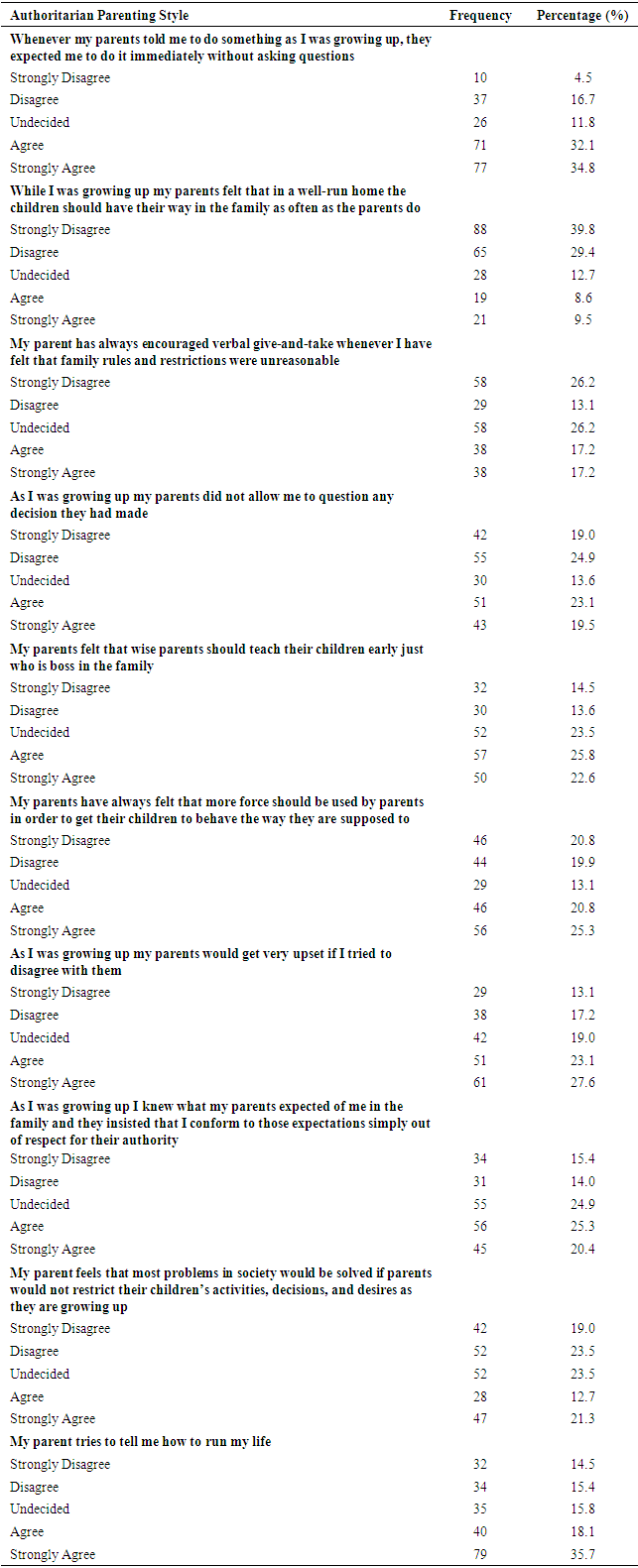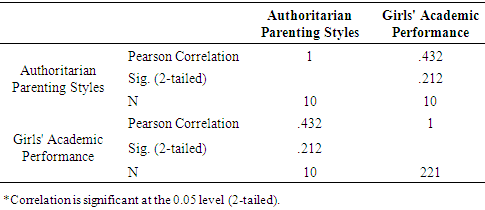-
Paper Information
- Paper Submission
-
Journal Information
- About This Journal
- Editorial Board
- Current Issue
- Archive
- Author Guidelines
- Contact Us
International Journal of Advanced and Multidisciplinary Social Science
2018; 4(2): 39-44
doi:10.5923/j.jamss.20180402.03

Influence of Parenting Styles on Academic Performance among Girls in Public Secondary Schools in Kenya
Rosemary Wangechi Kiama1, Peter J. O. Aloka2, Elizabeth Gumbi1
1The Catholic University of Eastern Africa, Nairobi, Kenya
2Department of Psychology & Educational Foundations, Jaramogi Oginga Odinga University of Science & Technology, Bondo, Kenya
Correspondence to: Rosemary Wangechi Kiama, The Catholic University of Eastern Africa, Nairobi, Kenya.
| Email: |  |
Copyright © 2018 The Author(s). Published by Scientific & Academic Publishing.
This work is licensed under the Creative Commons Attribution International License (CC BY).
http://creativecommons.org/licenses/by/4.0/

This study investigated the influence of authoritarian parenting style on Academic Performance among Girls in Public Secondary Schools in Kenya.The study employed correlation survey design. The study was informed by Baumrind’s Theory of Parenting Styles (TPS). Thirteen secondary schools in Makadara Sub-County were randomly sampled. The target population of the study comprised form two students sampled through stratified sampling and counseling teachers were randomly sampled. The study used questionnaire, interview guide and document analysis guide to collect data. The quantitative data was analyzed using descriptive (mean and standard deviations) and inferential statistics(Pearson correlation coefficients) on IBM SPSS version 22 while qualitative data was analyzed using quotes and narratives. The findings of the study revealed that authoritarian parenting style had a negative association of 43.2% on girls’ academic performance.
Keywords: Authoritarian Parenting Style, Adolescent, Girls, Academic Performance
Cite this paper: Rosemary Wangechi Kiama, Peter J. O. Aloka, Elizabeth Gumbi, Influence of Parenting Styles on Academic Performance among Girls in Public Secondary Schools in Kenya, International Journal of Advanced and Multidisciplinary Social Science, Vol. 4 No. 2, 2018, pp. 39-44. doi: 10.5923/j.jamss.20180402.03.
Article Outline
1. Introduction
- The academic performance of adolescents is a central focal point for any society due to the idea that ensuring their education helps promote a more successful future [3]. Students who have higher academic performance are at an advantage in terms of positive outcomes such as joy, pride, and happiness [7]. Having higher academic performance has been associated with positive characteristics, including self-esteem, self-efficacy, and motivation [5]. Academic success in terms of higher academic performance has long been thought to be the path to a stable livelihood and a successful future [9]. It may relate to having high academic achievement in childhood [8]. Low academic achievement may create many negative consequences for students. Students with low academic achievement may be more vulnerable to problems such as stress, hopelessness, delinquency, psychopathology, and substance abuse [2]. Researchers such as [10] have shown that parents, through their parenting styles built critical foundations for various aspects of children’s development and achievement. Moreover, [11] indicated that parenting style is one of the significant contributors to student’s academic achievement in school in Iowa State. Further, [13] postulated that parenting styles emphasize on the response parents provide to their children and the method which they use to demand compliance from their children. [4] categorized types of parenting style based on two dimensions which are responsiveness and demandingness. According to Baumrind, responsiveness refers to the degree that parents promote self-assertion and individuality by showing care and acceptance to children’s desires. Care and acceptance includes kindness, support for independence, and logical contact. Demandingness refers to demands that parents make on children to be included into society [4]. The demands are imposed through monitoring and controlling of children’s behaviors, as well as communicating the demands directly to the children.Literature on relationship between authoritarian parenting style and academic achievement exists. For example, [12] conducted a study in South Africa and concluded that parents practicing this style of parenting demand too much from their children while they seem to neglect their responsibility toward their children. [14] showed a positive and significant relationship between parents’ authoritativeness and their children’s school grades (academic achievement). According to [15], authoritarian parenting follows a rather dictatorial style involving the highest degree of control on children and very low levels of warmth in the United Kingdom concluded that the use of this authoritarian style precludes effective discussion, of any sort, between parents and children, which places more pressure on the children than any other parenting style. [18] conducted a study in India reported that in terms of academic performance they revealed that the high level of parental pressure incorporated within the authoritarian style often reduced children’s intrinsic motivation, causing them to be reliant on extrinsic sources, thus undermining the process of learning and academic performance. [1] found that authoritarian parenting leads to a competitive environment in which parents discourage spontaneity and support within the parent-child relationship decreases.In Kenya like many other African countries, parenting style is an issue of concern when considering adolescents’ academic performance especially girls. In Makadara Sub County, the mean score from Kenya Certificate of Secondary Education revealed poor performance especially in girls’ public secondary schools (KNBS, 2012). This was attributed to various factors but parenting styles was left out. Out of 10 school adolescent girls in the Sub County, 5 girls had poor academic performance which could be directly linked to home environment [16]. Despite the increasing dismal performance of girls in secondary schools, less has been done to analyze its correlation with parenting styles [17]. This is true despite the fact that the search for potential factors affecting the academic performance of secondary school students has long been a major research theme in the educational psychology literature because of its theoretical and practical significance.
2. Research Methodology
- The study employed correlational survey design in order to measure the extent to which parenting styles were related to adolescent girls’ academic performance (Field, 2014). However, qualitative data was also collected by means of interviews. This design was appropriate in this study because it might be scientifically difficult to control for other factors that influence girls’ academic performance. The target population of this study comprised 13 public girls’ boarding secondary schools. Two of these were Extra-County schools with 600 girls while the remaining 11 schools were sub-county category with 4,900 girls. These schools were chosen in order to find out if parenting styles influence girls’ academic performance. Further, the study also targeted all the adolescent girls in public boarding schools and teachers. Girls were key informants of this study because they explicate any relationship between parenting styles and their academic performance while teachers participated because they had been trusted with the social, psychological and intellectual up-bringing of adolescent girls in schools. The sample included 6 schools, 50 teachers and 600 adolescent girls. Questionnaires, interviews and document analysis guide were used to collect participants’ views concerning the relationship between parenting styles and adolescent girls’ academic performance. Content validity of this study was based on the examination of the instruments by researcher’s supervisors, researcher’s own reflective commentary, peer scrutiny, negative case analysis and pilot study. Cronbach’s coefficient alpha method was used to determine internal consistency (reliability) of the items. The reliability test yielded a value of .81 indicating that the questionnaire had met its conceptual fit. The researcher ensured credibility by the adoption of well established research methods, developing an early familiarity with the culture of participating schools before the first data collection dialogues took place, iterative questioning, negative case analysis, frequent debriefing sessions, peer scrutiny of the research project, thick description of the phenomenon under scrutiny, examination of previous research findings to assess the degree to which the project’s results would be congruent with those of past studies. First, exploratory data analysis was conducted to establish if the data met all assumptions of each statistical procedure. Data was then analyzed using parametric test (Pearsons Correlation Coefficient) using effect sizes to establish the degree of association between parenting styles and adolescent girls’ academic performance. The null hypotheses were tested and retained or rejected based on the significance level, p- value at 0.05 as the threshold. Finally, qualitative data was subjected to thematic analysis and integrated with the quantitative component based on similarity of themes and categories.
3. Findings & Discussions
- The results of demographic characteristics on category of school and age were reported. The participants comprised 221 form two girls. In terms of school category, majority (n = 138, 62.4%) of the girls were in extra county schools while (n = 10, 4.5%) were in county schools. These findings imply that this group of girls had done well in their last primary examination. Sixty nine (31.2%) of the girls were in sub county schools while (n = 4, 1.8%) were in national schools implying that they had good academic performance in primary school. In consideration of age, the results indicated that majority (n = 137, 62%) of the girls were within the age bracket of 16 – 17 years. Seventy nine (n = 35.7%) of the girls were 14 – 15 years. Two (0.9%) were within the age bracket of 18 – 19, (n = 2, 0.9%) were above 19 years while (n = 1, 0.5%) were below 13 years.The study sought to establish how authoritarian parenting style influences adolescent girls’ academic performance in public secondary schools in Nairobi, Kenya. To establish this, the study used a five-point Likert scale with 10 items denoting authoritarian parenting style. The scale was weighted as follows: Strongly Agree = 5, Agree = 4, Undecided = 3, Disagree = 2 and Strongly Disagree = 1. In addition, the measure of linearity of this scale revealed a Median of 3.0. The researchers then used frequency table to establish the responses concerning authoritarian parenting attributes. This analysis is presented in Table 1.
|
|
4. Conclusions & Recommendations
- In conclusion, the study findings pointed out to the fact that authoritarian parenting style negatively influenced the academic outcome (performance) of girls. Parents in this group were found to be verbally hostile towards the girls. They carried out corporal punishment and did not reason anything out with their girls. This lead to a lot of punitive strategies and directiveness when dealing with their girls and eventually made the girls to be anxious, fearful, indecisive, parent reliant and resistant to new ideas. This led to low academic achievements under democratic school environments where they were given the autonomy to freely think and learn alongside other girls from different backgrounds. This means that authoritarian parents limit and are a psychological threat the academic potential of their children. The study recommends that, Parents should continually seek advice of professional counselors and evaluate themselves against guidelines given concerning desirable parenting. When they do this, they may be able to know if the parenting style they ascribe to is best for positive influence of their children’s academic performance. This would make it easy to understand the other possible sources (causes) of low academic performance among children, isolate the problems and address them establish hence improving academic performance.
 Abstract
Abstract Reference
Reference Full-Text PDF
Full-Text PDF Full-text HTML
Full-text HTML
